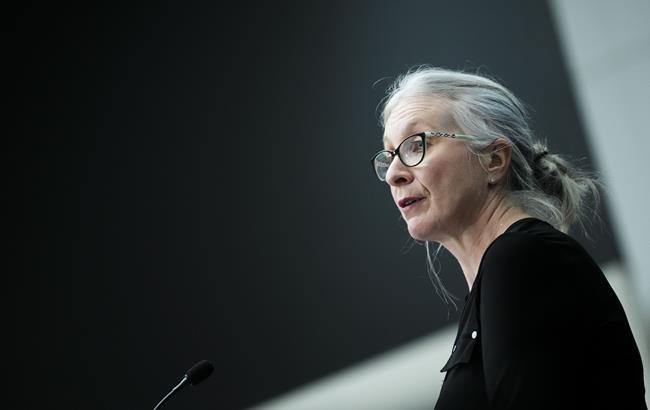MONTREAL — The federal minister of Indigenous services said Thursday she supports the will of Indigenous communities to be exempt from Quebec's new language law, which limits the use of English in the public service and increases French-language requirements in schools.
Patty Hajdu told a news conference she was "preoccupied" to hear that Indigenous leaders think the language law, known as Bill 96, will have a negative impact on the rights of First Nations children to be educated in the language and culture of their choice.
“We cannot put barriers in the way of children striving to reach their full potential, including barriers that involve language," Hajdu said. "We will continue to stand by and defend the leaders with whom I have the opportunity to work. I see it as an important part of my role as minister."
Hajdu made the comments after participating in a signing ceremony for a new agreement under which Ottawa will give $1.1 billion over five years to First Nations communities in Quebec to help fund education. The ceremony was held on the Mohawk territory of Kahnawake, south of Montreal.
Quebec's new language reform proactively invokes the notwithstanding clause of the Canadian Constitution to shield it from Charter challenges. It restricts the use of English in the public service and the legal system, and it requires students at English junior colleges to take three additional courses in French to graduate.
Indigenous communities say they are particularly worried about the new rules for junior colleges. John Martin, chief of Gesgapegiag on Quebec's Gaspé Peninsula, said Thursday that provincial language laws have been creating obstacles for English-speaking Indigenous students for decades.
"For 40 years we have been confronted with linguistic laws," Martin said. "We have students who can't graduate because they were unable to get the credits they needed, and Bill 96 raises the wall even higher."
He said Indigenous Peoples have constitutional rights just like Quebecers do, adding that the provincial government is acting like a colonial power. Martin said the federal government must "stand and support us" by addressing the issue of Indigenous rights — including language rights — guaranteed in the Constitution.
“When a language tends to dominate, it is a colonial practice and that means the extermination of other languages ​​and cultures," Martin said. "This is what we are up against."
Earlier, representatives from the federal government and the First Nations Education Council signed the $1.1-billion education agreement, the result of 10 years of negotiations.
The money will go toward building culturally adapted education programs for about 5,800 children across 22 communities. It will also fund school transportation and the recruitment and training of more than 600 teachers and other school staff. The First Nations Education Council, which represents eight Quebec First Nations, says the agreement will allow communities to assume full responsibility over their schools.
Daniel Gros-Louis, executive director of the First Nations Education Council, said "history has shown us the many broken promises of governments. The assumption of responsibility for education by and for the First Nations that we are celebrating today is our promise to ourselves, to our young people."
This report by The Canadian Press was first published July 14, 2022.
Pierre Saint-Arnaud, The Canadian Press


.png;w=120;h=80;mode=crop)

